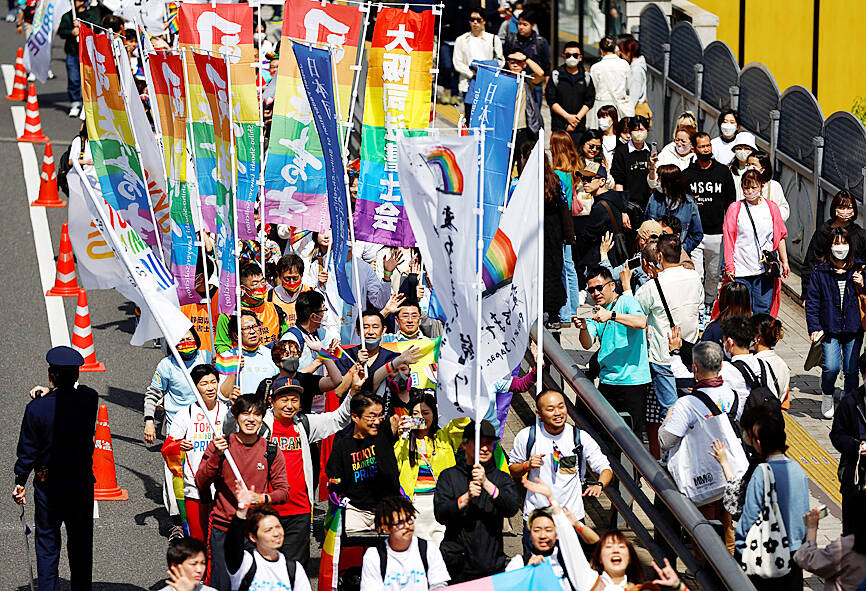Cheering, flag-waving crowds yesterday gathered in Tokyo for the first full Pride parade in four years, celebrating advances in LGBTQ rights, but also demanding that Japan join other advanced nations in legally recognizing same-sex marriage.
Change is slow in Japan, which is next month to host a G7 summit. It is the only member of the group that does not recognize same-sex marriage.
Growing support from the nation’s top business lobby and major companies is putting pressure on Japanese Prime Minister Fumio Kishida’s administration and his conservative ruling party.

Photo: Reuters
Organizers estimated that 10,000 people marched in the parade in the downtown Shibuya district.
Participants said they realized how their nation lagged the rest of the G7, but were hopeful of change.
“Japan is really far behind... We will fight until the entire country has same-sex marriage,” said Himama, who was wearing a pink-dyed goatee and declined to give his real name out of consideration for family.
“I think the government is both pretending to see us and pretending not to, but that change will really start happening from here on in,” Himama said.
Masako Mori, a special adviser to Kishida on LGBTQ affairs, attended, but did not mention same-sex marriage in brief remarks before the parade began, instead urging “greater understanding of LGBTQ.”
Crowds lined the sidewalks, waving rainbow flags and shouting “happy pride” at marchers, who included a group from Taiwan — the only Asian nation with same-sex marriage.
Since the last pre-COVID-19 pride parade in 2019, the number of Japanese municipalities allowing same-sex couples to enter partnership agreements has surged from 26 to about 300, covering about 65 percent of the population.
However, the agreements do not allow partners to inherit each other’s assets and deny them parental rights to each other’s children. Hospital visits are not guaranteed.
Kishida in February fired an aide who sparked outrage by saying people would flee Japan if same-sex marriage was allowed, but the prime minister remains noncommittal about same-sex marriage, even as polls show 70 percent of the public in favor.
“Circumstances in each country are different, and I believe it is important to proceed with discussions carefully,” Kishida told a foreign media roundtable on Thursday.
Japan’s constitution refers to marriage as being between “both sexes” and mentions “the equal rights of husband and wife.” Allowing same-sex marriage would require amending the civil code.
Some lawmakers have vowed to pass a law promoting “understanding of LGBTQ” before the summit. Activists and business leaders say this is a good step, but falls short, adding that Japan at last year’s G7 summit also committed to ensuring equal rights and anti-discrimination measures for LGBTQ.
Masakazu Tokura, head of the powerful Keidanren business lobby, said last month that he found the gap between Japan and other countries on LGBTQ issues “embarrassing” during a trip to the US.
The situation has long limited the talent pool for global firms, but even traditional Japanese companies find their international competitiveness endangered without diversity, including LGBTQ rights.
“Basically all the debates would be by Japanese men, and that made it hard to grow as a global firm,” NEC Corp chief diversity officer Chika Sato said.

The Taiwanese passport ranked 33rd in a global listing of passports by convenience this month, rising three places from last month’s ranking, but matching its position in January last year. The Henley Passport Index, an international ranking of passports by the number of designations its holder can travel to without a visa, showed that the Taiwan passport enables holders to travel to 139 countries and territories without a visa. Singapore’s passport was ranked the most powerful with visa-free access to 192 destinations out of 227, according to the index published on Tuesday by UK-based migration investment consultancy firm Henley and Partners. Japan’s and

NATIONAL SECURITY THREAT: An official said that Guan Guan’s comments had gone beyond the threshold of free speech, as she advocated for the destruction of the ROC China-born media influencer Guan Guan’s (關關) residency permit has been revoked for repeatedly posting pro-China content that threatens national security, the National Immigration Agency said yesterday. Guan Guan has said many controversial things in her videos posted to Douyin (抖音), including “the red flag will soon be painted all over Taiwan” and “Taiwan is an inseparable part of China,” while expressing hope for expedited “reunification.” The agency received multiple reports alleging that Guan Guan had advocated for armed reunification last year. After investigating, the agency last month issued a notice requiring her to appear and account for her actions. Guan Guan appeared as required,

Japan and the Philippines yesterday signed a defense pact that would allow the tax-free provision of ammunition, fuel, food and other necessities when their forces stage joint training to boost deterrence against China’s growing aggression in the region and to bolster their preparation for natural disasters. Japan has faced increasing political, trade and security tensions with China, which was angered by Japanese Prime Minister Sanae Takaichi’s remark that a Chinese attack on Taiwan would be a survival-threatening situation for Japan, triggering a military response. Japan and the Philippines have also had separate territorial conflicts with Beijing in the East and South China

A strong cold air mass is expected to arrive tonight, bringing a change in weather and a drop in temperature, the Central Weather Administration (CWA) said. The coldest time would be early on Thursday morning, with temperatures in some areas dipping as low as 8°C, it said. Daytime highs yesterday were 22°C to 24°C in northern and eastern Taiwan, and about 25°C to 28°C in the central and southern regions, it said. However, nighttime lows would dip to about 15°C to 16°C in central and northern Taiwan as well as the northeast, and 17°C to 19°C elsewhere, it said. Tropical Storm Nokaen, currently